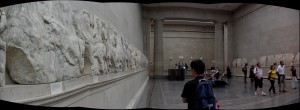Anyone who has had a class with Professor Maggidis will know the Greek side of the Elgin Marble story quite well. According to him, the elaborate carvings were forcifully taken from the sides of the Parthenon by Lord Elgin, who did not have a right to them. The British Museum told a very different story. The current position of the Museum is that the Marbles were removed legally with the permission of the Ottoman authorities. However, the Greeks were not asked their opinion. Since the early 1980s, the Greek government has argued for the return of the Marbles to Athens. The British Museum believes that they are “a unique resource for the world: the breadth and depth of its collection allows the world to re-examine cultural identities and explore the complex network of interconnected world cultures.” This same mission statement also applies to the other artifacts of the Museum. However, “the Trustees’ view [the Elgin Marbles] are part of everyone’s shared heritage and transcend cultural boundaries.” To them, the splitting of the Parthenon Marbles between six major museums of the world allow for different interpretations to be examined. We are not so sure. What gives the British Museum the right to possess the sculptures after the Ottoman Empire dissolved and the Greek government asked for them back? Would they appreciate capstones from Stonehenge appearing in the Louvre or another major art museum of the world? Where’s the line between exhibiting cultural artifacts and claiming them as your own? You might ask us if we benefited from seeing the Elgin Marbles for free in the British Museum. Of course we did.

The Elgin Marbles in the British Museum - should they be here?
Continuing on our critical journey through the British Museum, we were struck by the assumption that every culture that the British encountered became part of the British cultural heritage. This was especially apparent in parts of the former Empire. This attitude was even expressed in places that dissolved from the Empire centuries ago. For example, after Buffalo Bill’s Wild West show in London, Queen Victoria was talking to Black Elk (a Native American chieftain) and said “I wish that I had owned you people, for I would not carry you round as beasts to show the people.” Although Queen Victoria probably meant well, this statement is preposterous! We think she meant that she didn’t approve of the Native Americans parading around making a parody of their culture for the entertainment of others. However, there seems to be a discrepency when looking at the colonies under Victoria’s control (India, Hong Kong, Africa, etc.).
The British Museum has made us rethink who should have posession over a cultural artifact. We believe that it’s a major grey area. Does a British archeologist digging in France have the right to the objects found, or does the French government? There are too many variables. We enjoyed almost everything we saw at the Museum and it was a great learning experience, but we couldn’t help but feel an uneasy sense of awe in the rooms where the decoration was in Britain, but the structure was elsewhere in the world.
